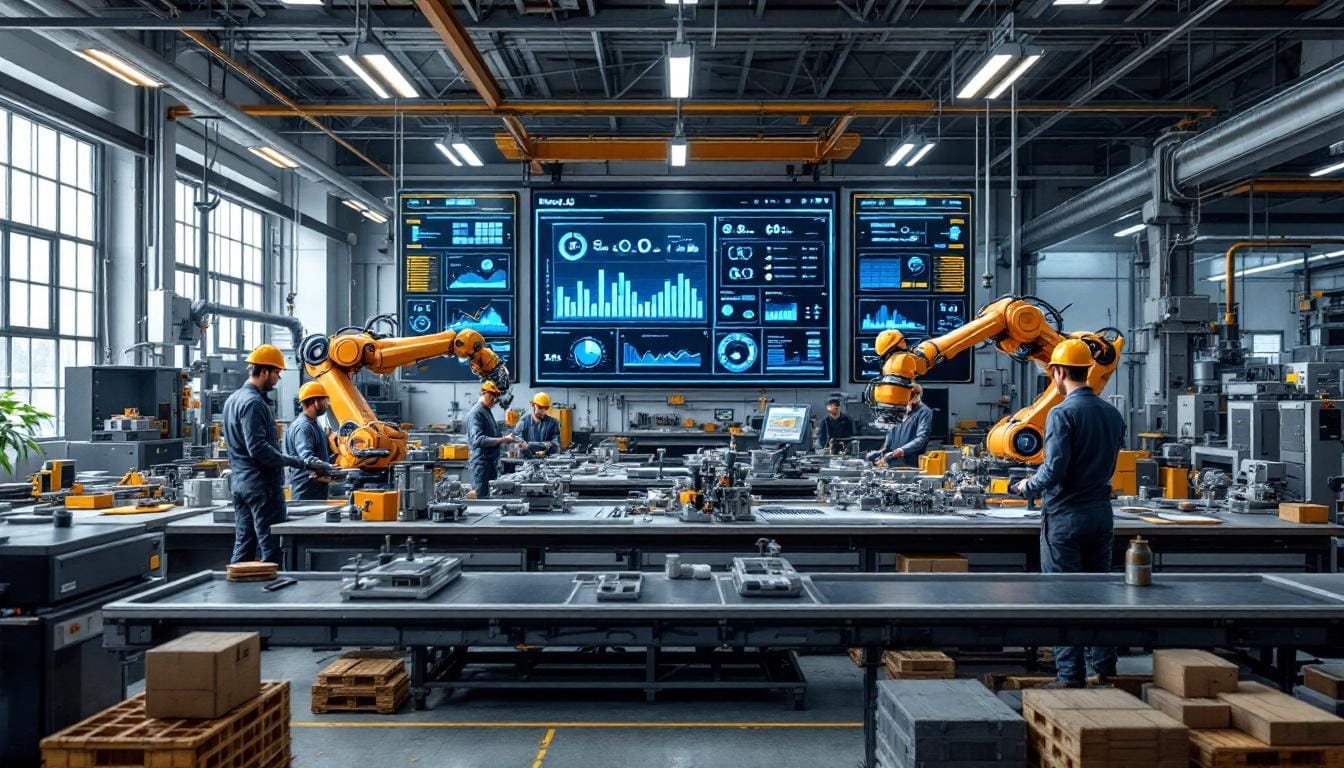In today’s competitive landscape, supply chains are undergoing a rapid transformation.
The integration of new technologies is essential to maintain competitiveness.
Innovative companies are adopting solutions to enhance the resilience of their operations.
The optimization of processes through data analysis enables better decision-making.
Industry 4.0 technologies provide powerful tools to efficiently manage logistics flows.
By focusing on proactive management, organizations can anticipate and overcome challenges.
This integrated approach fosters an agile supply chain that is responsive to market uncertainties.

In the digital age, industry 4.0 is revolutionizing the manufacturing sector by introducing advanced technologies that connect and optimize every aspect of production. But is your workshop connected to fully leverage these innovations? Let’s explore together the crucial importance of industry 4.0 and how it transforms traditional workshops into smart hubs.
Table des matières
ToggleWhat is Industry 4.0 and why is it essential for modern workshops?
Industry 4.0 represents the fourth industrial revolution, characterized by the integration of digital technologies, the Internet of Things (IoT), artificial intelligence (AI), and big data into manufacturing processes. This transformation enables workshops to become intelligent environments, where every machine, device, and system is interlinked and capable of communicating in real time.
The essence of this revolution lies in enhancing the efficiency, flexibility, and responsiveness of workshops. By adopting industry 4.0, companies can reduce downtime, optimize supply chains, and customize their products on a large scale. This results in increased productivity and reduced costs, while responding more effectively to market demands.
For workshops, being connected means continuously monitoring machine performance, anticipating failures through predictive maintenance, and adjusting processes in real-time to maximize efficiency. This connectivity is essential to remain competitive in a constantly evolving manufacturing environment.
What are the main benefits of connectivity in workshops?
Connectivity brings a multitude of tangible benefits to manufacturing workshops. First, it allows for increased transparency of operations. Through sensors and monitoring systems, managers can obtain real-time data on production, equipment performance, and stock levels. This visibility enables informed decisions to be made quickly and processes to be continuously optimized.
Next, resource optimization is another key advantage. Connected technologies enable more efficient management of human and material resources. For example, AI can analyze production data to identify bottlenecks and propose solutions to eliminate them, thereby improving overall workflow.
Moreover, predictive maintenance is made possible through industry 4.0. By continuously monitoring the condition of equipment, workshops can anticipate failures before they occur, thus avoiding costly downtimes and extending the lifespan of machines. This results in improved reliability and reduced maintenance costs.
Another significant advantage is the customization of production. Connected workshops can easily adapt their processes to meet specific customer demands, thus offering greater flexibility and better customer satisfaction. This ability to customize on a large scale is crucial in a market where consumer expectations are evolving rapidly.
What tools and technologies are essential for a connected workshop?
For a workshop to be truly connected, it must integrate several key tools and technologies of industry 4.0. Among the most essential are the Internet of Things (IoT), which enables machines and equipment to connect to a centralized network. With IoT, every device can send and receive data, thus facilitating monitoring and real-time control.
Artificial intelligence (AI) also plays a crucial role in analyzing the collected data to forecast trends, optimize processes, and automate repetitive tasks. AI enables workshops to make smarter decisions and continuously improve their operations.
Big data is another essential component, as it allows the processing and analysis of large quantities of data generated by connected systems. This thorough analysis helps identify improvement opportunities and develop strategies based on accurate and reliable information.
Furthermore, robust and secure wireless networks are essential to ensure smooth communication between various equipment and systems. Reliable connectivity is the foundation on which all other industry 4.0 technologies rely.
Finally, software integration is essential to harmonize different technologies and ensure they work together coherently. Integrated platforms allow for centralized data management and coordinate operations effectively.
How does industry 4.0 enhance the resilience of supply chains?
The resilience of supply chains is a major challenge for manufacturing companies, and industry 4.0 plays a key role in strengthening them. Connected technologies provide an end-to-end visibility of the supply chain, offering managers an overview of processes from production to final delivery. This transparency facilitates the quick identification of disruptions and allows for more effective responses to unforeseen events.
Through predictive analytics, companies can anticipate demand fluctuations and adjust their production accordingly. This reduces the risks of overstocking or stockouts, thus contributing to better resource management and greater flexibility in the face of market changes.
Moreover, process automation allows for minimizing human errors and improving operational accuracy. Automated systems can respond more rapidly to demand variations and adjust production levels in real-time, thereby increasing the responsiveness and resilience of the supply chain.
Another crucial aspect is the improved collaboration among different actors within the supply chain. Connected technologies facilitate the sharing of information and communication between suppliers, manufacturers, and distributors, thus strengthening coordination and synchronization of activities.
By integrating these technologies, companies can not only enhance their resilience to disruptions but also improve efficiency and competitiveness in the global market.
What challenges need to be overcome to adopt industry 4.0 in a workshop?
The adoption of industry 4.0 in manufacturing workshops is not without its challenges. One of the primary obstacles is the initial cost of advanced technologies required for the transformation. Investment in connected equipment, AI systems, and big data platforms can be substantial, especially for small and medium enterprises.
Additionally, the complexity of integrating new technologies with existing systems poses a major challenge. Workshops often need to rethink and reorganize their infrastructures to enable seamless communication between different equipment and systems, which may require specific technical skills.
The security of data is also a crucial issue. With increased connectivity, workshops become more vulnerable to cyberattacks and leaks of sensitive data. It is essential to implement robust security measures to protect information and ensure operational continuity.
Another challenge lies in the training of employees. To fully leverage the technologies of industry 4.0, it is necessary for personnel to be trained and proficient in the use of these tools. This involves an investment of time and resources to ensure a smooth and effective transition.
Finally, the company culture must evolve to embrace change and encourage innovation. Leaders should promote a proactive attitude towards digital transformation and motivate their teams to adopt new ways of working.
What are some concrete examples of industry 4.0 success in the manufacturing sector?
Many workshops and manufacturing companies have successfully embraced industry 4.0, demonstrating the tangible benefits of this transformation. One notable example is the new CIIIT center led by Tata Technologies in Pune, which marks the beginning of an era of innovation and skill development for industry 4.0. This center serves as a hub of excellence where best practices and the latest technologies are implemented to enhance manufacturing processes.
Another example is the pilot program of the industry 4.0 academy, which culminated in a ceremony at Penn State DuBois. This program has enabled the training of qualified professionals capable of implementing innovative solutions in their workshops, demonstrating the positive impact of education and training in adopting industry 4.0.
In the field of smart infrastructure, the market for smart pumps is accelerating due to smart infrastructure and the integration of industry 4.0. These connected pumps optimize fluid management in manufacturing processes, reducing waste and improving energy efficiency.
Finally, the collaboration between UST and T-Works to drive industry 4.0 innovations in the semiconductor and automotive manufacturing sectors is another success story. This collaboration allows for the development of advanced technological solutions that improve the precision, speed, and quality of manufactured products.
These examples illustrate how industry 4.0 can transform manufacturing workshops into innovation centers, increasing their competitiveness and efficiency in the global market.
How to implement industry 4.0 in your workshop?
Implementing industry 4.0 in your workshop requires a structured and gradual approach. Here are the key steps to follow for a successful transformation:
1. Assess needs and define objectives
Start by conducting a comprehensive assessment of your current processes and identify areas where industry 4.0 can bring significant improvements. Set clear and measurable objectives, such as increasing productivity, reducing costs, or improving product quality.
2. Invest in appropriate technologies
Select the technologies that best meet your needs and objectives. This may include installing IoT sensors, integrating AI systems for data analysis, or setting up a centralized management platform. Ensure that these technologies are compatible with your existing infrastructures.
3. Train personnel
Organize training sessions to familiarize your employees with the new technologies and processes. Proper training is essential to ensure successful adoption and avoid resistance to change.
4. Integrate systems
Make sure that the different systems and technologies you have implemented communicate effectively with each other. This may require software or hardware adjustments to ensure seamless integration and optimal data utilization.
5. Monitor and adjust
Once industry 4.0 is implemented, it is crucial to continuously monitor performance and adjust processes based on the results obtained. Use the collected data to identify opportunities for improvement and constantly optimize your operations.
6. Collaborate with partners
Work with technology partners and experts in industry 4.0 to benefit from their expertise and support throughout the transformation process. Collaboration helps accelerate the adoption of new technologies and maximize the benefits of industry 4.0.
By following these steps, your workshop can gradually become a connected environment ready to leverage the advantages of industry 4.0 and position itself competitively in the manufacturing market.
What are the future impacts of industry 4.0 on the manufacturing sector?
Industry 4.0 continues to profoundly and sustainably shape the future of the manufacturing sector. As technologies evolve, connected workshops will become increasingly intelligent, autonomous, and integrated. Here are some anticipated future impacts:
Advanced automation: The ongoing integration of AI and advanced robotics will enable even greater automation of manufacturing processes, reducing reliance on human labor and increasing production accuracy and speed.
Mass customization: Flexible production technologies will allow for more effective responses to customization demands, offering products tailored to specific customer needs without compromising economies of scale.
Sustainability and energy efficiency: Industry 4.0 promotes more sustainable production practices by optimizing resource use, reducing waste, and improving energy efficiency in manufacturing operations. This contributes to more environmentally friendly production.
Global interconnection: Connected workshops will be part of an interconnected global ecosystem, enabling unprecedented collaboration and coordination among different supply chain actors, partners, and customers, thereby facilitating collaborative innovation and knowledge sharing.
Evolving skill sets: The landscape of skills required in the manufacturing sector will evolve, with a growing demand for qualified professionals in digital technologies, data analysis, and management of automated systems. This will encourage continuous training and skill development within companies.
By preparing now for these changes, manufacturing companies can not only survive but thrive in a future dominated by industry 4.0.
To learn more about the latest innovations and trends in industry 4.0, feel free to check our articles such as An industry 4.0 expert headlining a major manufacturing show in Australia, which highlights the leaders and pioneers of this industrial revolution.




